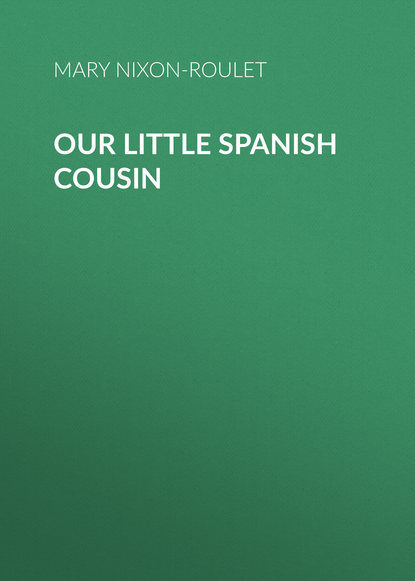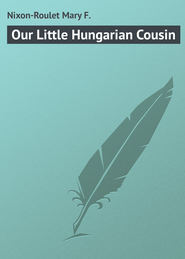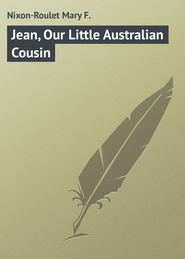По всем вопросам обращайтесь на: info@litportal.ru
(©) 2003-2024.
✖
Our Little Spanish Cousin
Настройки чтения
Размер шрифта
Высота строк
Поля
"Be careful, son! Remember how the little Prince of Granada rode too fast through the streets, and fell from his pony and was killed."
"Have no fear," her husband said, smiling, "the donkey will not go fast enough to hurt him; that is why I selected him." And he placed Juanita up behind her brother, bidding Manuel walk beside them, while Mazo, unbidden, jumped around.
Everything else that Fernando had sank into insignificance when compared to the little donkey, which he named Babieca, and which he and Juanita rode whenever they had a chance. Babieca was a kind little beast, though something of a rogue. He seemed to know that he must play no tricks when Juanita rode him, and he behaved himself well; but when Fernando rode, it was quite another matter. Babieca would prick up his long ears and go along quietly, then stop suddenly without saying "by your leave," and, of course, Fernando would go over his head. He would not hurt himself at all, and the naughty little mule would look at him wonderingly as if to say: "Now what on earth are you doing down there?" Fernando soon grew to expect such antics and was on the lookout for them.
When St. Anthony's Day came, of course Babieca had to go with the other four-footed friends of the saint, to be blessed and insured from all harm through the year. The seventeenth of January is the day of St. Anthony, patron of mules, horses, and donkeys, and a grand parade took place. All the people of the town who had such animals drove them down to the church to be blessed and to get a barley wafer. Many of the animals were gaily decorated with streamers and ribbons, and some with flowers; and all along the streets small booths were set up containing little images of St. Anthony and barley cakes. Babieca behaved very well at his blessing, though his refractory tongue did try to nibble the priest's stole; but some of the horses kicked and neighed, and, with the braying of the many donkeys and mules, there was a din not often heard in staid Granada.
There were no more fêtes for the time being, and Fernando, a trifle spoiled by all the gaiety, had to return to his studies again. It was a long month before carnival time, but his thoughts went forward to that delightful season, and it seemed to the little boy as if it would never come. However, as "all things come to him who will but wait," the great day arrived at last, and Fernando was wild with joy. Carnival time is just before the beginning of Lent, and is a season of great merriment. Under a turquoise sky, with no clouds to mar its fairness, there is a pageant almost like those of the days of chivalry, and Fernando and Juanita, attended by their faithful Manuel and Dolores, saw it all. Fernando dressed as a page, and his sister as a court lady of the days of Isabella the Catholic, and they were masked, as are all the people who throng the streets on these gay days.
Sunday, Monday, and Tuesday the carnival continues, each year, and the children are asked to little dances at the houses of friends, and also to hear student choirs sing and to see plays. But what they most enjoy is mingling in the crowds upon the paseo, throwing confetti at those who throw at them, seeing the flower-decked carriages, the wonderful costumes; monks, nuns, generals, court ladies, flowers, animals, all are represented, – all are laughing and throwing confetti right and left. Children are selling confetti, crying shrilly, "Confetti, five centimos a packet. Showers of a million colours! Only a perro Chico!"[10 - Perro Chico, little dog, name given to a five-centimo piece because of the little lion upon it.] Ah, how gay and delightful it all is! Juanita saw much, and Dolores lay down at night thanking the saints that carnival lasted but three days! But Fernando saw everything, and poor Manuel's legs were weary as he kept pace with his little master, now here, now there, now everywhere, laughing and jesting, the merriest lad in all the carnival.
Alas, it was all over! Ash Wednesday dawned, dull and heavy, the weather as sad and sorry as the day. Fernando dragged himself to church, where his brow was marked with ashes according to custom, and gazed longingly at the Entierro de la sardina, a bit of pork the size and shape of a sardine, buried to show that the fast had begun, for no one in Spain eats meat on Ash Wednesday, and very little of it in Lent.
Fernando looked so depressed at supper that his mother asked him:
"What is the trouble, little son, are you ill?"
"No, mamma," he said. "But it is so long till Easter."
"Not if you do not think about it," said his mother with a smile. "Do your work with a will, and the days will pass quickly. If you are a good boy, you shall have a treat at Easter."
"Oh, what will that be," he asked, and Juanita cried, eagerly, "Shall I have it, too?"
"Both of you," the mother said. "Your father is going to take us to Sevilla, to see the grand Easter festival, and we shall see your brother and sister as well, and your cousins and your Aunt Isabella, so you must be good children."
"Indeed we will," cried both, joyously, at the thought of so much pleasure.
CHAPTER VII.
EASTER IN SEVILLA
Easter in Sevilla! What a gay and charming time it is! Flowers are everywhere, blooming in beauty, and all the people seem joyous in the thought that the long season of fasting is over.
Fernando and Juanita had arrived in the city on the Saturday before Palm Sunday, and were wild with delight at seeing their cousins, Mariquita, Pepita, and Angel, and in looking forward to the delights of the week's holiday with its processions and fêtes. Beginning with the beautiful Procession of the Palms, on Palm Sunday, all through Holy Week are processions and celebrations, and the little folk thoroughly enjoy them.
Their older brother and sister were there, also, and full of wonderful tales of what they had done at school. Fernando thought Pablo was a wonderful being, and that everything he did was perfect. He could hardly wait until he himself would be big enough to go away to college; and little Juanita felt quite the same way about Augustia, who had learned many things in the convent.
"Indeed, niña," she said, "it is pleasant at school with the girls, but that Mother Justina makes one work so hard, and that the play-hours are few. I have embroidery to make, and lessons to say, and my class learns French as well as Castilian. But the other girls are charming. Most of all I like Paquita de Guiteras, an Americana, at least she comes from the Island of Cuba, and the girls say that she is an Indian, and that her mother was an Indian princess married to her father, a noble Spaniard. Of this I cannot say, and she herself does not relate, but she says that in Cuba the Spaniards have often married the Indians and have been kind to them, and have not destroyed them as have the Americanos in the Estados Unidos. Well, niña, Paquita is the merriest of girls! She has always some prank to play upon some one, and, indeed, she cares not if it is the Mother Superior herself, so she can have her joke. Her aunt, good Sister Mercedes, is always fretting for fear lest Paquita should be in disgrace, but it worries Paquita not at all. One night she did the funniest thing. There is one girl who is very mean to the little ones, always teasing them, and they dare say nothing, as she is the niece of the Mother Superior, and she believes nothing against her. This Teresa Alcantara once found a little girl, and teased her until Paquita could stand it no longer, and flew at Teresa and bit her hand. Sister turned at that moment and saw the bite, but she had not seen what had gone before, and would not listen to what I tried to tell her, and Paquita is always too proud to try to make excuses, and just looked at Sister so fiercely from her great black eyes that the Sister was still more displeased.
"'Thou art but a savage wildcat,' she said, and took her to Mother Superior for punishment. She could not have any playtime for a whole week, and she would have to apologize to Teresa, too, and I think she hated that the worst of anything. But she got even with her, as you shall hear. She found out that Teresa was terribly afraid of cats, and one night, when we were all safely tucked away in our little beds, there came from behind Teresa's curtains a terrible scream, and she jumped out of bed and rushed up and down the dormitory. Such a breach of decorum was never seen before, and the nuns were shocked to a degree. Teresa kept shrieking, 'A wild beast is in my bed! a wild beast is in my bed!' and after calming her down they went to investigate. What do you think they found? A feather duster! It was tucked under the sheets, and who could have put it there? No one knew, but every one felt that Paquita was the only one who could have thought of such mischief. But the sisters did not try to find out, for one of them had seen Teresa teasing the little girl, and knew why Paquita disliked her so much; and after that the big bully let us little ones alone."
"Oh, it must be so nice," sighed Juanita, but Pablo laughed, and said that those were girl's stories, and that far more exciting things happened at the naval college, especially when they all went on a cruise.
On Easter Sunday morning the children went to the cathedral to see the wonderful dances which take place but three times a year. Fernando and Juanita were struck dumb with the beautiful cathedral, so unlike the Gothic one of Granada; for this one at Sevilla is a Saracenic church, built hundreds of years ago, begun by the Moorish Sultan, Yakub al Mansour, in 1184.
How strange it seemed to see dancing in church! Fernando and Juanita sat beside their mother, on their little camp-stools, for there are no pews in Spanish churches. The whole centre of the church is empty, and people kneel there during the mass, or if they are too tired or too little to stand, they rent camp-stools for half a cent, and an old woman who has them in charge hobbles along with a stool, which they may keep while the service lasts.
The men generally stand, and it is interesting to see them settle themselves in a comfortable position when the sermon begins, and stand there almost without moving while the preacher speaks, sometimes a half-hour, sometimes a whole hour. But the hearers do not seem to mind, for these Spanish monks are very fine preachers.
As the children gazed at the beautiful altar covered with flowers, there came the sound of music, – violins, flutes, flageolets, and hautboys all making a quaint harmony, – and with the music was mingled the sound of youthful voices, fresh and sweet, and a band of boys entered the chancel, and gliding down the altar steps danced quietly, singing as they danced. Their bodies swayed to and fro in time to the music, at first slowly, then, as the time quickened, castanets click-clicked with the other sounds, and the boys moved faster and faster, still in perfect time, yet not with wild abandon, but rather with dignified respect for the place. They were quaintly dressed in the court costumes of the Middle Ages; on their heads were big Spanish hats, turned up at one side with a sweeping blue feather, a mantle of light blue was over one shoulder, their vests were of white satin, their hose and shoes of white. The boys danced on until the great bells of the Giralda rang out, and then they vanished, the music growing softer and softer, until its last strains sounded far away, like a floating wave of heavenly harmony.
"How pretty the dance was," said little Juanita, as they walked home from the service. "Why do they dance in church?"
"The Holy Scriptures say that David danced before the Lord," her mother answered, "so perhaps that is the reason the Sevillians think this is a form of worship, but you must ask your cousins to tell you how it was first done."
"Do tell me, Mariquita," said the little girl, and her cousin said, "I do not know how it happened at first, but it has been done ever since the Moors were here in Sevilla. Only once in hundreds of years has it been stopped, and then an archbishop said it was not right to have dancing in church. He made every one very angry, for the people said, 'What our fathers did is good enough for us!' So they went to the Pope, and he said that he could not tell unless he saw the dance. So the boys and the musicians were taken to Rome, and there danced before the Holy Father, who said, 'I see no harm in this, any more than in the children's hosannas before Our Lord when He entered Jerusalem. Let them have their dance so long as the clothes which they wear may last.' Then they came back and so determined were they to continue it for ever, that they never let the clothes wear out to this day. If one piece of a suit shall be worn it is so quickly mended or repaired that no suit has ever worn out all at once, so that these are the same suits as those worn long ago."
"I am so glad they still have it," said Fernando, "for I wouldn't have missed seeing it to-day for anything."
CHAPTER VIII.
RAINY DAYS
"Mamma, would you allow me to go to the bull-fight with father and Pablo?" asked Fernando next day.
"No, indeed, my son, a bull-fight is no place for women and children," his mother replied. "I have never been to one in all my life, and Juanita shall never attend. I wish Pablo did not care to go, either, but he must do as he wishes now that he is grown. A boy cannot always be at his mother's girdle, but you must be much bigger than now before you will see such a sight."
Fernando sighed, but he knew that there was no use saying more, for the word of la madre was law. He was very anxious to see a bull-fight, for every boy in Spain desires that above all things. The fights are held on all holidays, but the finest one of all is at Easter. The immense amphitheatre of Sevilla holds thousands of spectators, men wild with excitement over the sport, and even women, though the most refined ladies do not frequent the corridos. The bull is turned loose in the centre of the huge ring and tormented until he is ready to fight. Men with sharp-pointed darts, called banderillos, tease him by throwing their barbs at him, and pricking his skin until he is nearly crazy. Then men mounted on horseback, the picadores, wave scarlet cloths before his eyes, exciting him still more, for a bull hates red worse than anything in the world. He dashes at the cruel cloth, and sometimes is too quick for the man who carries it, tossing him on his horns, but generally it is the poor horse who is killed, and the man jumps away to safety. The matador is the one who slays the bull, and he is sometimes killed himself. It is a terribly cruel affair, though Spaniards say it is not so cruel as our prize-fighting.
It was late that evening when Fernando went to bed, and ere he did so there was quite an excitement. They were all seated upon the piazza of the house, he and Juanita, his cousins and their elders, when there was a great cry from the street, "The toro! The toro!" and a clatter of horses' hoofs. All screamed loudly, for to have a bull escape from the pens is a frequent occurrence, and not a very pleasant one. The cries became louder, the horses' hoofs beat nearer and nearer, and as in the dusk a figure dashed down the street, the señora, screaming loudly, caught Juanita to her and tried to climb the pillar at her side. She was very stout, and the pillar was very slippery, and she could not climb with one arm, so she slid down as fast as she climbed up, squealing all the time, "A toro, Madre di Dios! a toro!"
Fernando was frightened, too, but he was a brave boy, and he tried his best to push his mother up out of danger, boosting her as she slipped down, but not helping very much, as you might suppose. It seemed to him an hour, but it was only a minute before servants came from the house, and as they did so a horse dashed up before the pillars, and, stopped too hastily by his rider, slid along the stones on his hind feet. On his back was Pablo, waving his sombrero, and crying, "What a corrido! It was glorious! Six bulls to die, and Rosito never in such form! But, madre mia, what is the matter?" as he sprang from his horse and assisted his mother to a seat.
The señora could not speak, but Fernando said, "We thought the noise was a bull escaped, and I was assisting my mother to a height of safety."
Pablo looked at the little figure speaking so gravely, then threw back his head and shouted with laughter, but seeing Fernando's hurt expression, stopped quickly, and said:
"Bravo, little brother, thou art a good knight to care for thy mother and sister!"
"Better than thou!" His mother had regained her voice by this time.
"Thou art still the same Pablo, and will yet be the death of thy poor mother," but Pablo kissed her hand so gallantly, and begged her pardon so amiably, that she quite forgave him.
Next day, alas! it was raining, and it rained so hard all that day, and nearly all of the next, that the children were like little bears in a cage. They played with everything they could think of, but after awhile they grew restless and quarrelled so that the grown-up folk grew nervous, too.
At last, Mariquita's father, gay and charming Uncle Ruy, came to the rescue.
"Who wants to take a trip into the country with me?" he asked, and as each one squealed "I!" he said:
"Of course we can't go, really, but we can make believe, and I shall take you to a hacienda outside the old wall of Sevilla.
"It lies amidst orange and olive groves, and all kinds of flowers, and many of the things we eat come from that very place. Who knows how they pickle olives?"
"Are olives pickled?" asked Juanita, and Mariquita said:
"How queer it seems that all the things we eat have to go through so much before they can be eaten. I did not know that olives had to be pickled."
"Yes, mi niña, and we will play that we are visiting an olive grove, and we can see the way the olives are picked and made ready for food. See, here are the trees, and the fruit is picked from them and placed in baskets. There are two kinds of olives used, green and ripe, the green ones are picked just before they begin to turn soft. These are separated from the others, and the bitter taste is removed by soaking in fresh water for a long time, or some picklers soak them for a shorter time in a solution of potash lye. This softens the skin and extracts all bitterness, but the olives must be soaked in clear water, which is frequently changed to get all the potash off. Then they are placed in weak brine, and afterward in stronger, until they have the salty taste which we like so much. Then they are put in small barrels and taken to the bottling rooms, where they are bottled and labelled for the market."









